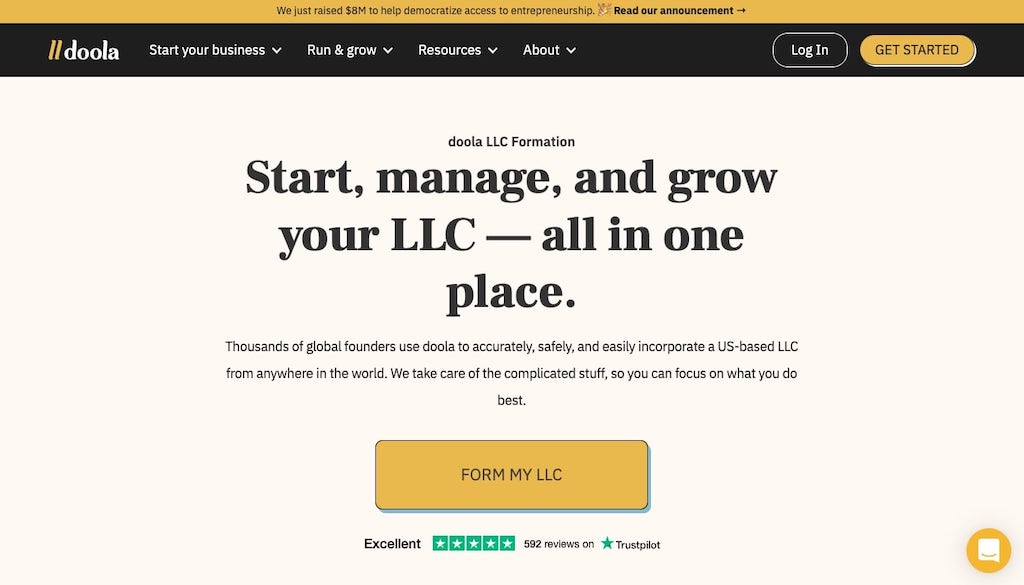As an entrepreneur, knowing the difference between a Partnership vs LLC is important. In this article, we'll explain the differences and benefits of each.

Imagine that you’ve got the perfect business plan, either meeting the demand for online therapy, providing graphic design skills, or providing accounting services for local start-ups. Now, you just need to formalize the registration process to make it official — but do you choose a partnership or an LLC?
At doola, we’ve helped thousands of global founders start, manage, and grow their LLCs conveniently and efficiently. Through our experience, we’ve determined how both a partnership and LLC offer unique benefits and serve a valuable purpose.
Before we unpack the similarities and differences between a partnership and an LLC, it’s important to familiarize yourself with the nuanced details and definitions of both, helping you make an educated (and confident) decision.
What is a partnership?
A partnership is a formal arrangement between two or more parties, determining how the business management and operation will unfold. It also describes the share of its profits among owners.
There are different types of partnerships available, depending on each person’s involvement. For example, a general partnership and a limited partnership operate differently. Then you also get a silent partner with a vested interest in the business but is not involved in the day-to-day operations. Regardless of the specific set-up, all members share profits and liabilities.
Benefits of a partnership
Establishing your business as a partnership offers many benefits, making it an attractive type of business model. Consider the following advantages of a partnership.
Combined effort
Partnering with other professionals closes the gap in expertise, bringing knowledge and experience to the table where you may be lacking. A partner may offer more connections, expand your network and future business relationships, and have a fresh perspective on issues where you may have a blind spot.
By combining your professional effort in a partnership, you can also have a better work-life balance as you share the load of running a business.
More resources, fewer expenses
A partner doesn’t only bring their expertise to the business but also their money. By investing in the business, you have more capital to buy equipment, software, advertise, and grow the business.
Sharing the financial burden for expenses and capital expenditures also leads to more substantial savings than approaching the task alone. When you grow the business further, you’ll have more capital and better borrowing capacity.
Better decision-making
They say that two heads are better than one. This is especially true when making strategic decisions to expand your business, solve complicated problems, and even decide on everyday questions such as who to hire or which color to introduce into your holiday promotional material.
In addition to offering a new perspective on daily happenings and problems, partners also offer moral support on important tasks and issues.
Easy to get started
Partnerships are less formal than corporations, with fewer legal obligations than other business structures. The convenience trickles down to impact the accounting process, tax returns, and other document requirements.
It’s also fairly easy to start a partnership. In most instances, you only need a verbal agreement. Although, it’s recommended to take the time and effort to establish an official partnership agreement that outlines the rights and responsibilities of everyone involved.
Considerations of a partnership
While the perks of a partnership are magnetic, it’s important to assess the disadvantages and consider how they will impact your business management and growth.
- No independent legal status
- Unlimited liability
- Potential for conflict
- Shared profits
- Loss of autonomy
- Future selling complications
What is an LLC?

A limited liability company (LLC) is not only a business structure but also a legal entity. The biggest benefit of an LLC is that it protects business owners from personal responsibility for any business debts or liabilities.
Although a US-based business structure, it’s possible to form an LLC from anywhere in the world. Regulations vary from state to state, and expert advice can nudge a business owner in the right direction. Forming an LLC using a registered agent removes some admin associated with the business formation.
Benefits of an LLC
There are many reasons that aspiring entrepreneurs and business owners choose an LLC over a C corporation, partnership, and other corporate structures. Consider the following advantages as a starting point.
Limited liability for business owners
As the name suggests, an LLC offers limited liability for LLC owners, protecting their assets from any liability or debt incurred by the business. Creditors cannot pursue the personal assets of owners to pay business debts, protecting the owner’s house, savings account, and other assets.
Keep in mind that there are a few conditions to be aware of, with liability protection becoming vulnerable when “piercing the corporate veil.”
Pass-through taxation
By default, LLCs are subject to pass-through taxation, which means that all business profits and losses pass through to each member’s individual tax return. Pass-through entities have a tax structure where a business’s finances are taxed at the owner’s personal rates, and the LLC is not liable to pay federal corporate income tax.
Business owners (of which there can be one, two, or more) avoid double taxation and can be taxed as a C corporation or an S corporation. The best option will depend on the business specifics.
Operational and managerial flexibility
LLCs operate with flexible membership, with no limit on the number of members. The management structure is also flexible, with the option of being “member-managed” or “manager-managed” depending on the owners’ preferences.
A member-managed LLC means members are actively involved in the company’s operations, while a manager-managed LLC trusts management to a non-member.
Easy to form and maintain
Forming an LLC is easy and cost-effective, with little maintenance needed. Unlike partnerships and corporations, LLCs are also easy to maintain, with limited compliance requirements.
As an added bonus, an LLC offers additional credibility as it holds a legal, state-issued stamp of approval!
Considerations of an LLC
As with all corporate structure options, there are a few details to keep front of mind when considering an LLC.
- Transferring ownership is a process
- Business owners must be strategic with self-employment tax
- Limited liability has limits (such as piercing the veil)
When to choose a partnership vs. LLC
The perfect business structure will depend on a few factors and what you hope to achieve. Let’s explore the direct similarities and differences between an LLC and a partnership to offer more perspective.
Similarities between a partnership and an LLC
Although different entities, there are a few similarities between a partnership and an LLC. For example, income distribution and tax reporting work similarly as profit is shared evenly among owners unless otherwise stipulated. In addition, income is treated as a pass-through for tax reporting.
LLCs and partnerships are considered simpler structures, and they are easier to form. Unlike a partnership, LLCs require formal registration, but the effort helps with credibility and prevents future fallouts.
Differences between a partnership and an LLC
An LLC and a partnership are not the same. While some states allow for a limited liability partnership, the rules differ for an actual LLC.
For example, a limited partnership has at least one general partner who runs the company and remains fully liable for all debts and one limited partner.
While an LLC is a legal entity on its own, a partnership is a business entity owned by two or more people who share legal responsibility for the business. An LLC can have more than one owner, but a partnership must have at least two owners.
The IRS considers both partnerships and LLCs as “disregarded entities,” which means that owners report their share of profits and losses on their personal tax returns. However, an LLC can choose to be taxed as a corporation. In some instances, taking this route helps owners save money on taxes (and boosts their retirement savings).
Finally, an LLC has an unlimited lifespan, regardless of whether the owner passes away or sells their share of the company. In contrast, a partnership dissolves when one partner dies or sells their ownership.
When to choose an LLC vs. Partnership
Now that you’re familiar with the similarities of both business structures and their specific advantages, how do you decide which is best for you?
Partnerships are a common option among doctors and lawyers who often choose to form a limited liability partnership. These groups of professionals enjoy the tax benefits of a partnership, which are often more attractive than a corporation (but not necessarily better than an LLC).
An LLC typically offers better personal liability protection and more tax flexibility than a partnership, making it a preferred option among new business owners. There are fewer categories to consider with an LLC, and there is a lot more flexibility on how many individuals are needed to form the entity, which makes it easier for investors to play a role in decision-making.
Register your LLC with doola
Ultimately, the best option will depend on your individual requirements and purpose. The choice of business structure should align with your vision and what you hope to accomplish.
A doola, we help small business owners with the necessary paperwork, reducing the admin required to get up and running. Interested in learning more? Get started with doola today!








